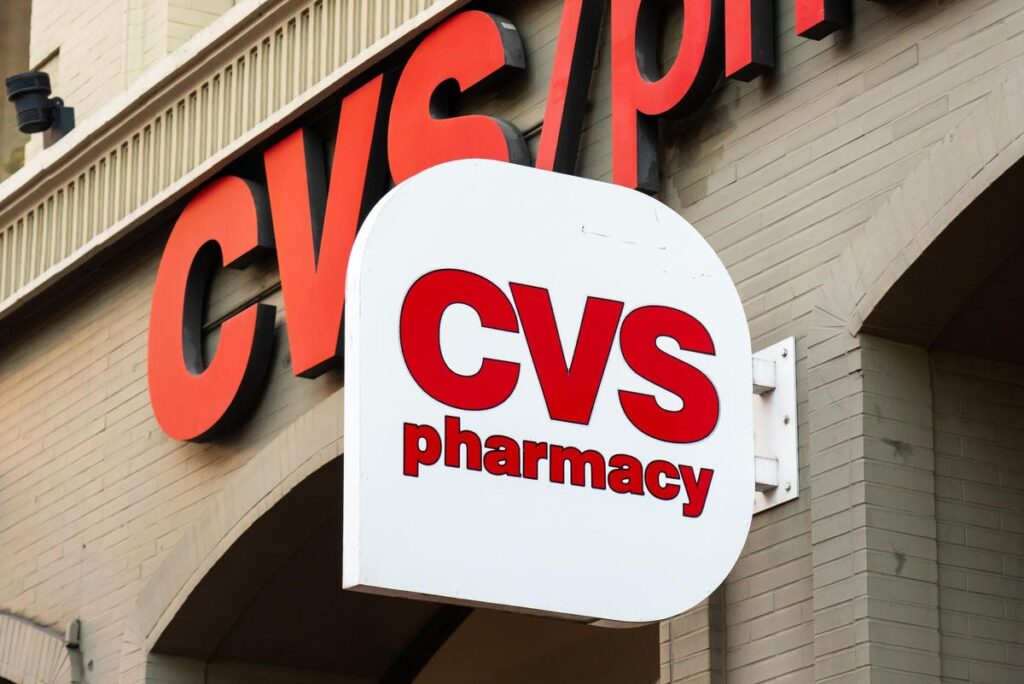Topline
Blue Shield of California said it hopes to save $500 million a year by dropping its affiliation with CVS Health’s Caremark and splitting the majority of its pharmacy benefits across three partner companies—Amazon, the Mark Cuban-owned Cost Plus Drugs and Abarca—the Wall Street Journal reported Thursday.
American retail and health care company CVS Pharmacy logo seen at one of their stores.
Key Facts
Blue Shield of California told the Journal it believed the new system would drive down costs for its consumers, as well.
Under the new setup, Amazon will handle home drug delivery, Cost Plus Drugs will deliver lower-cost medication access and Abarca will process pharmaceutical claims.
CVS Stock dropped 9.5% Thursday morning, shares were trading at $65.79 as of 10:05 a.m., after reports of the pending separation from Blue Shield of California, a nonprofit insurer with 4.7 million members and $22.9 billion in annual revenue.
The ability to negotiate prices with drug manufacturers and put an end to the traditional practices of rebate offers and hidden fees drove Blue Shield to reconsider its structure, the Journal reported.
Blue Shield executives told the Journal they believe the change could save 10% to 15% on pharmaceuticals after its full launch in 2025. CVS Caremark will still handle specialty medications for Blue Shield and pharmacy benefit manager Prime Therapeutics will help negotiate drug pricing under the new plan.
Key Background
Blue Shield is the latest player taking a new approach to medications in an attempt to disrupt the high-cost pharmaceutical industry. As it stands now, CVS Caremark negotiates drug prices for Blue Shield and provides services like delivery of medications, but executives say the new plan will allow the insurer to negotiate prices with more transparency using alternatives like Cuban’s company and Amazon pharmacy, which launched in 2020 and automatically applies any available drug coupons to prescriptions filled through Amazon. Cuban’s Cost Plus Drugs launched as a registered pharmaceutical wholesaler in 2022, and buys directly from drug manufacturers, then sells the medication online at a fixed markup of 15%, plus $8 for shipping and fees. Customers have to pay for drugs out of pocket, insurance is not accepted, but they see significantly lower prices—the generic version of the prostate cancer drug Zytiga, for instance, is listed for $33.60 on the website, compared to its $1,093 retail price. Cuban, who has never put his name on any other company, last year said he expects Cost Plus Drugs to become profitable in 2023. Abarca is a Puerto Rico-based pharmacy benefits manager that negotiates drug discounts on behalf of health insurers. Abarca has worked with several other Blue Cross Blue Shield Association licensees.
Crucial Quote
“If we get this right, this will be the most impactful thing I’ve ever done,” Cuban said of Cost Plus Drugs.
Tangent
Amazon has expanded its health footprint in the last year, most notably through its partnership with One Medical, a membership-based primary care practice. One Medical gives patients access to online healthcare 24/7 and provides appointments at more than 125 offices in the country. The purchase was made at the same time as the closure of Amazon Care, a business that offered similar doctor-locating services as One Medical but stayed open less than three years. Amazon bought online pharmacy PillPack for $1 billion in 2018 and rebranded it as Amazon Pharmacy, and last year lost a bidding war with CVS to acquire Signify Health, a home health technology and services provider.
Forbes Valuation
Dallas Mavericks owner and Shark Tank investor Cuban had a net worth of $5.1 billion as of Thursday, ranking him as the world’s 540th richest person. Amazon is owned by Jeff Bezos, the world’s third-richest person with a $157.7 billion net worth.
Further Reading
A Big Health Insurer Is Ripping Up the Playbook on Drug Pricing (Wall Street Journal)
Mark Cuban Considering Leaving Shark Tank As He Bets His Legacy On Low-Cost Drugs (Forbes)
Amazon’s Growth In Healthcare Is Unparalleled (Forbes)


